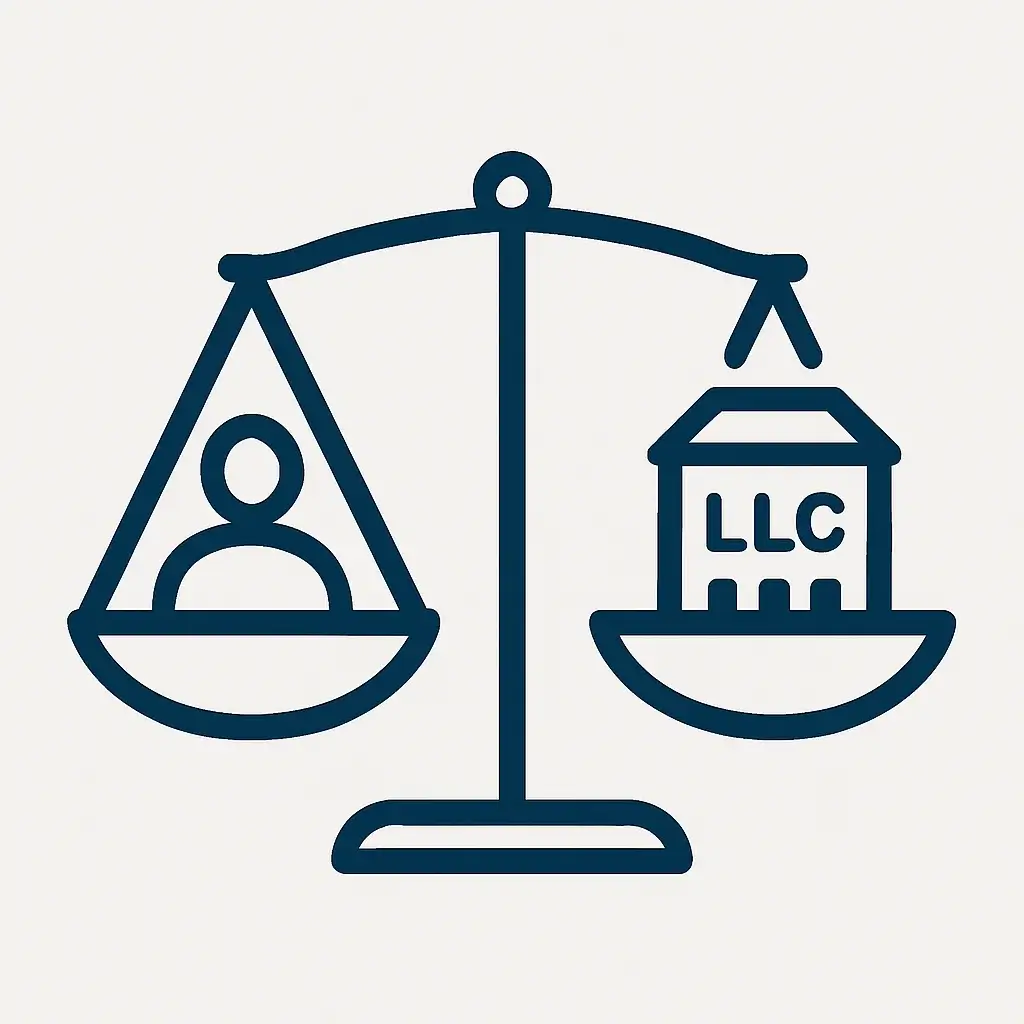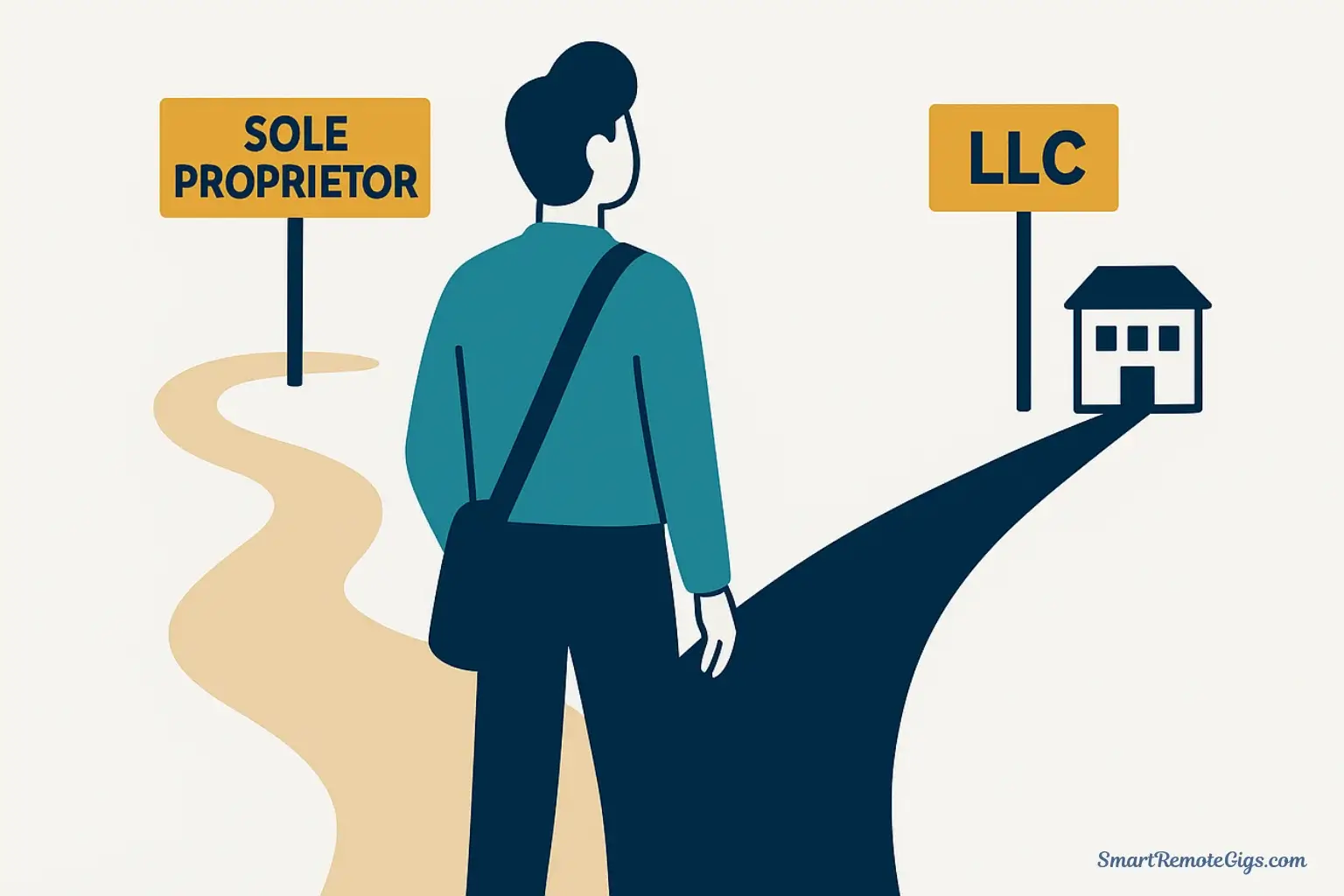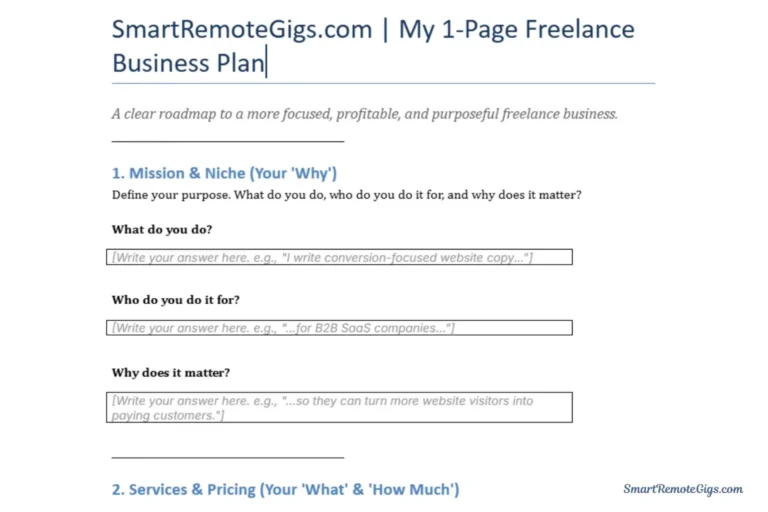You just landed your first big client—a $10,000 project that makes your freelance work feel undeniably real. As you draft the contract, a question stops you cold: “Am I actually a legitimate business? Should I have an LLC or something?”
You’re not alone. The question of freelance business structure confuses nearly every solo entrepreneur at some point. The legal terminology feels intimidating, the tax implications seem murky, and you’re worried about making an expensive mistake.
Here’s the good news: choosing between an LLC and sole proprietorship doesn’t require a law degree. This guide will walk you through both options in plain English, helping you make an informed decision that protects your assets and sets your business up for success.
What is a Sole Proprietorship? (The Default)
A sole proprietorship is the simplest business structure—and it’s what you become automatically the moment you start freelancing and earning money. There’s no paperwork to file, no registration fees, and no separate legal entity. You and your business are legally the same thing.
When you operate as a sole proprietor, you report business income and expenses on your personal tax return using Schedule C. You use your Social Security number for tax purposes (though you can also get an Employer Identification Number if you prefer). Any money your business earns is your personal income.
The Pros of Sole Proprietorship

- Completely free: No setup costs, filing fees, or ongoing administrative expenses. You start earning money, you’re in business.
- Incredibly simple: No formation documents, minimal regulatory requirements, and straightforward tax filing—one additional form attached to your personal return.
- Complete control: Make every decision without maintaining corporate formalities or documenting business resolutions.
For many new freelancers earning modest income, this simplicity is exactly what they need. There’s no point in adding complexity before you’ve proven your business model works.
The Cons of Sole Proprietorship
- Zero personal liability protection: Because you and your business are legally identical, your personal assets—house, car, savings—are all at risk if your business faces a lawsuit or can’t pay its debts.
- Unlimited exposure to lawsuits: If a client sues you for breach of contract or holds you liable for errors in your work, they can pursue your personal assets to satisfy the judgment.
- Limited credibility with corporate clients: Some larger companies prefer—or even require—working with LLCs or incorporated businesses rather than sole proprietors.
What is an LLC? (The Upgrade)
An LLC, or Limited Liability Company, is a separate legal entity that you create by filing paperwork with your state. Think of it as drawing a legal line between you personally and your business. Once established, your LLC can enter contracts, own assets, and conduct business under its own name.
The term “limited liability” is the key benefit here. It means that the LLC’s liabilities are limited to the business itself. If your business faces a lawsuit or debt, generally only the LLC’s assets are at risk—your personal assets remain protected.
The Pros of an LLC

- Personal asset protection: If your business is sued or faces financial trouble, your home, personal bank accounts, and other assets are typically shielded. Creditors can only pursue the LLC’s assets.
- Professional credibility: Having “LLC” after your business name signals legitimacy. Some clients, especially larger corporations, prefer or require working with formal business entities.
- Tax flexibility: While a single-member LLC is taxed like a sole proprietorship by default, you have the option to elect corporate tax treatment if it becomes advantageous as your income grows.
- Business longevity: An LLC can exist beyond your involvement, making it easier to sell your business or bring on partners in the future.
The Cons of an LLC
- Formation costs: Creating an LLC requires filing articles of organization with your state, typically costing between $50 and $500 depending on location. Some states also charge annual fees or franchise taxes.
- Ongoing compliance: Most states require annual reports and renewal fees. You’ll need to maintain proper records and keep business finances separate from personal accounts.
- More complex administration: You’ll need an operating agreement, a separate EIN from the IRS, and must follow certain formalities to preserve your liability protection.
The Core Differences: A Simple Comparison Table

| Factor | Sole Proprietorship | LLC |
|---|---|---|
| Liability Protection | None. Your personal assets are at risk if the business is sued or incurs debt. | Strong. Personal assets are generally protected from business lawsuits and debts. |
| Taxes | Business income reported on your personal tax return (Schedule C). You pay self-employment tax on all profits. | Default: Same as sole proprietorship (pass-through taxation). Option: Can elect corporate taxation if beneficial. |
| Setup Cost | Free. No paperwork or filing required. | $50-$500+ depending on state. Annual fees may also apply. |
| Administrative Effort | Minimal. Simple recordkeeping and one additional tax form. | Moderate. Annual reports, separate bank accounts, formal recordkeeping required to maintain protection. |
| Credibility | Viewed as individual contractor by some clients. | Perceived as more professional and established business entity. |
| Best For | New freelancers, low-risk services, modest income levels. | Established freelancers, higher income, riskier services, clients who prefer formal entities. |
When Should a Freelancer Form an LLC? (The Big Question)
The decision to form an LLC isn’t about reaching a specific milestone—it’s about evaluating your risk, income level, and business goals. Here’s a practical framework to guide your decision.
Consider forming an LLC if:
✅ Your income is growing: You consistently earn over $60,000–$75,000 annually, giving you meaningful assets to protect.
✅ You sign large contracts: Your projects are substantial (think $10,000+ projects), increasing your financial risk exposure.
✅ Your field has inherent risks: You offer consulting that affects business decisions, handle sensitive data, provide financial advice, or work in any area with higher lawsuit potential.
✅ You want to work with corporate clients: Some larger companies prefer or require working with formal business entities rather than individuals.
✅ You want peace of mind: You own a home, have significant savings, or simply value knowing your personal finances are shielded from business risks.
✅ You plan to hire help: Bringing on contractors or employees significantly increases your liability exposure.
Stick with sole proprietorship if:
✅ You’re just starting out: Testing the waters or earning modest supplemental income means the simplicity of sole proprietorship makes sense.
✅ Your business risk is very low: Work that carries minimal liability—like writing blog posts, creating simple graphics, or other low-risk creative services.
✅ You’re not yet profitable: Your income is under $30,000 annually or you’re barely covering expenses.
✅ You want maximum simplicity: Some freelancers prefer to focus entirely on landing clients and delivering great work before adding business structure complexity.
The key insight: most successful freelancers eventually form an LLC. It’s less about whether you’ll do it and more about when. Starting as a sole proprietor and transitioning to an LLC as your income and risk increase is a perfectly reasonable path.
A Note on Taxes: The “Pass-Through” Advantage
One common misconception about LLCs is that they complicate your taxes. For most freelancers, this isn’t true.
By default, a single-member LLC is what the IRS calls a “disregarded entity.” This means the IRS treats your LLC exactly like a sole proprietorship for tax purposes. You still report business income and expenses on Schedule C attached to your personal tax return. Your business profits “pass through” to your personal income, and you pay taxes just once at your personal rate.
The LLC structure doesn’t change what you owe—it only provides legal protection. You’ll still pay self-employment tax (Social Security and Medicare) on your net business income, just as you would as a sole proprietor.
The difference appears on contracts and legal documents, not on your tax return. You’ll sign client agreements as “Your Name, Member of Your Business Name LLC” rather than simply “Your Name,” but April 15th looks largely the same.
As your business grows, you have the option to elect corporate taxation (S-Corp status), which can provide tax savings on high incomes by allowing you to pay yourself a reasonable salary and take remaining profits as distributions that aren’t subject to self-employment tax. However, this adds complexity and usually only makes sense above certain income thresholds ($80,000-$100,000+ annually).
Your Legal Structure is Part of Your Overall Business Plan
Choosing between an LLC and sole proprietorship isn’t an isolated decision—it’s one component of your comprehensive business strategy. Your legal structure should align with your business goals, risk tolerance, and growth trajectory.
If you’re creating a freelance business plan (and you should be), your legal structure belongs in the “Business Systems & Structure” section. Think of it as part of your business foundation, alongside your client onboarding process, invoicing system, and financial management.
Your legal structure affects how you present yourself to clients, how you manage risk, and how you think about your business’s long-term viability. It’s worth getting right.
Taking Action: Your Next Steps

If you’ve decided an LLC makes sense for your freelance business, here’s how to move forward:
- Research your state’s requirements. Visit your Secretary of State’s website to understand filing fees, annual report requirements, and specific rules for your location. Requirements vary significantly by state.
- Choose your business name. Most states require LLC names to be unique and include “LLC” or “Limited Liability Company.” Check name availability through your state’s business entity database.
- File your Articles of Organization. This is the official document that creates your LLC. Many states allow online filing, making the process straightforward.
- Get an EIN from the IRS. This free Employer Identification Number serves as your business’s tax ID. You can apply online at the IRS website in about 15 minutes.
- Create an Operating Agreement. Even as a single-member LLC, this document outlines how your business operates. It’s not always required by law, but it’s crucial for maintaining your liability protection.
- Open a business bank account. This is essential for maintaining the separation between personal and business finances that preserves your LLC’s legal protections.
- Get proper insurance. An LLC provides legal protection, but it doesn’t replace professional liability insurance or general business insurance, which protect against risks LLCs don’t cover.
If you’re staying with sole proprietorship for now, that’s fine too. Just commit to revisiting this decision every six months as your business grows. What makes sense at $20,000 annual income may not make sense at $70,000.
Frequently Asked Questions
Q: Can I switch from a sole proprietorship to an LLC later?
A: Absolutely. This is a very common and recommended path. You can operate as a sole proprietor while you’re starting out and then file for an LLC once your income and risk justify the cost and effort. The transition is straightforward—you simply form the LLC and start operating under the new structure.
Q: Do I need a lawyer to form an LLC?
A: For a single-member LLC with a simple structure, many freelancers successfully file the paperwork themselves using their state’s online portal or a reputable online service like Northwest Registered Agent or LegalZoom. However, if you have partners, a complex situation, or simply want professional guidance, consulting an attorney is always a good idea.
Q: Does having an LLC mean I don’t need business insurance?
A: No. An LLC protects you from business debts and legal judgments, but it doesn’t cover things like professional negligence or errors in your work. Professional liability insurance (also called Errors & Omissions insurance) is still highly recommended to protect against claims related to the quality of your services. Think of an LLC and insurance as complementary protections, not substitutes.
Q: Will forming an LLC complicate my taxes?
A: For most freelancers, no. A single-member LLC is taxed exactly like a sole proprietorship by default—you still file Schedule C with your personal tax return. The only difference is you’ll need to get an EIN (which is free and takes 15 minutes online). The tax complexity only increases if you later elect S-Corp status, which typically only makes sense at higher income levels.
Q: What if my state has expensive LLC fees?
A: Some states (like California with its $800 annual franchise tax) do have higher LLC costs. In these cases, you need to weigh the annual expense against the value of liability protection. For many freelancers earning solid income, it’s still worth it. Alternatively, some freelancers form LLCs in states with lower fees, though this has its own complications and may not provide the protections you expect.
The Bottom Line
The LLC vs. sole proprietorship choice comes down to a simple tradeoff: simplicity versus protection. There’s no single right answer, only the right answer for your current business stage.
Most successful freelancers eventually form an LLC. The key is to be intentional—start simple if you’re just beginning, and as your business grows in income and complexity, revisit this decision every six months. What matters isn’t the structure you choose today, but that you understand why you’re choosing it and when it makes sense to upgrade.
Disclaimer: This article provides general information for educational purposes and should not be considered legal or tax advice. Business structure decisions affect your personal liability and tax obligations in ways that depend on your specific situation, location, and circumstances. Always consult with a qualified attorney, accountant, or tax professional before making decisions about your business structure. State laws vary significantly, and your individual situation may have unique factors that affect the best choice for you.







